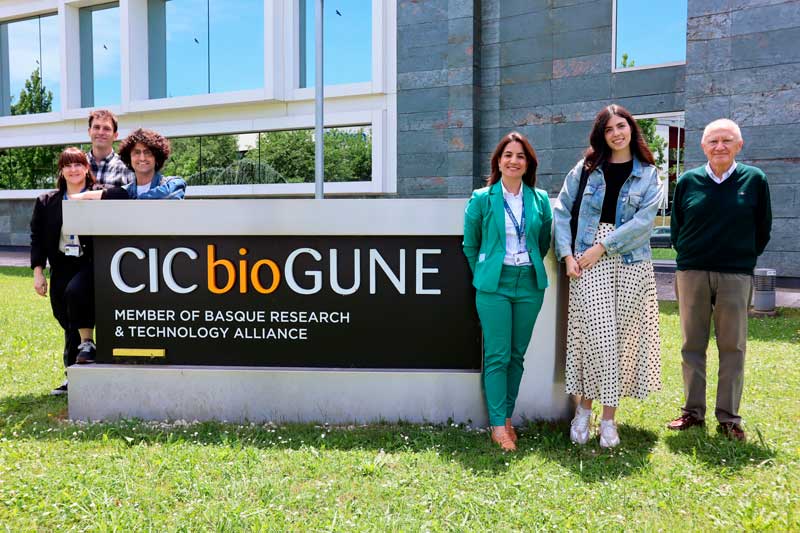
2025/06/05
CRIS Contra el Cáncer visits CIC bioGUNE to follow up on its funded oncology research projects
Representatives from CRIS Against Cancer Foundation visited CIC bioGUNE today to gain a closer insight into the breast and prostate cancer research projects they are funding at the centre.
As part of the visit, they were shown around the facilities and had the opportunity to engage with the scientific teams behind the research.
The visit served to strengthen collaboration and share progress in innovative therapies aimed at achieving more effective cancer treatments.
This morning, CIC bioGUNE, member of BRTA, welcomed representatives from CRIS Contra el Cáncer Foundation, an organisation committed to promoting research that delivers new therapeutic solutions in the fight against cancer. The purpose of the visit was to get a close look at the centre’s infrastructure and follow up on the scientific projects that have received their support.
During the visit, CRIS team met with researchers leading several lines of investigation into breast and prostate cancer, all of which have received funding from the foundation in recent years.
Among the highlighted projects is one led by Dr. Arkaitz Carracedo, focused on treatment resistance in prostate cancer. His team studies a specific type of tumour cell known as “persistent cells,” which are able to survive conventional therapies and later trigger relapse. Although small in number, these cells can remain dormant for extended periods and later reinitiate tumour growth. The aim of the project is to characterise these cells in depth and identify their weaknesses to develop therapies that can target and eliminate them specifically. This research seeks to open up new therapeutic avenues for a form of cancer that remains one of the most common among individuals assigned male at birth.
Dr. Ana Ruiz-Sáenz leads another CRIS-funded project, this one focused on HER2-positive breast cancer. Her team is studying the effectiveness of an innovative treatment called Trastuzumab-Deruxtecan (T-DXd), which is already yielding promising results in people with this tumour type. However, not all patients respond in the same way, and the biological factors that determine treatment success are not yet fully understood. Interestingly, some positive responses have also been observed in individuals with low or even negative HER2 levels, raising new scientific questions. To address these issues, the team uses advanced cellular models and clinical samples from patients to investigate the biological mechanisms behind response and resistance to the drug. Their findings will be key to optimising treatment and extending its benefits to a wider group of patients.
The visit also included a presentation of the research led by Dr. Isabel Mendizábal, which aims to better understand the process of metastasis in prostate cancer. Metastasis is the leading cause of mortality in this type of cancer and makes treatment significantly more difficult. Her project applies computational analysis to complex biomedical data, combining information on tumour cells and their surrounding environment. The goal is to identify, from the time of initial diagnosis, which tumours are most likely to become metastatic. With this knowledge, predictive clinical tools and more personalised treatments could be developed for high-risk patients, ultimately improving their long-term outcomes.
The visit from CRIS Contra el Cáncer was a valuable opportunity to strengthen ties between the two institutions and underscore the importance of oncology research as a pathway to new, effective treatments for people affected by this disease. At CIC bioGUNE, we are deeply grateful for the ongoing support of the CRIS Foundation, which allows our teams to continue advancing toward a more precise, effective, and humane medicine.
About CRIS Contra el Cáncer
The CRIS Contra el Cáncer Foundation is a non-profit organization dedicated to promoting and developing research to fight cancer. With the aim of providing the scientific community with the necessary resources, the foundation strives to close the funding gap compared to other European countries.
About CIC bioGUNE
The Centre for Cooperative Research in Biosciences (CIC bioGUNE), member of the Basque Research & Technology Alliance (BRTA), located in the Bizkaia Technology Park, is a biomedical research organization conducting cutting-edge research at the interface between structural, chemical, molecular and cell biology, with a particular focus on generating knowledge on the molecular bases of disease, for use in the development of new diagnostic methods and advanced therapies.
About BRTA
BRTA is an alliance of 4 collaborative research centres (CIC bioGUNE, CIC nanoGUNE, CIC biomaGUNE y CIC energiGUNE) and 13 technology centres (Azterlan, Azti, Ceit, Cidetec, Gaiker, Ideko, Ikerlan, Leartiker, Lortek, Neiker, Tecnalia, Tekniker y Vicomtech) with the main objective of developing advanced technological solutions for the Basque corporate fabric.
With the support of the Basque Government, the SPRI Group and the Provincial Councils of the three territories, the alliance seeks to promote collaboration between the research centres, strengthen the conditions to generate and transfer knowledge to companies, contributing to their competitiveness and outspreading the Basque scientific-technological capacity abroad.
BRTA has a workforce of over 4,000 professionals, executes 22% of the Basque Country's R&D investment, registers an annual turnover of more than 300 million euros and generates 100 European and international patents per year.
See a large version of the first picture





